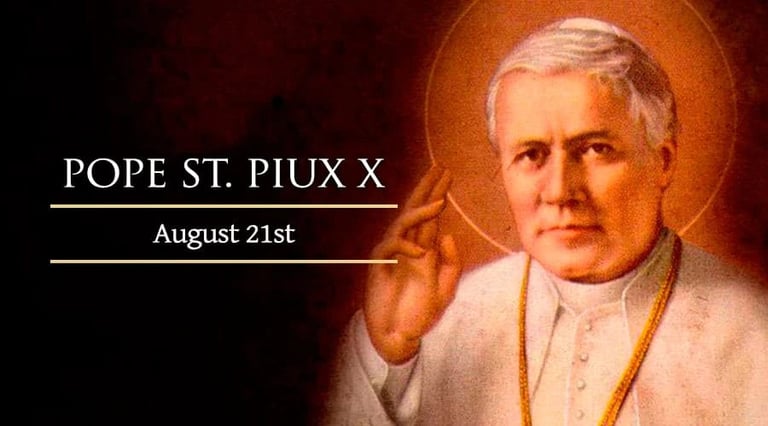Saint of the day August 21, 2025
Pope St. Pius X
DAILY SAINT
Nirmala Josephine
8/21/20252 min read


St. Pius X was a Pope of the Catholic Church who served from 1903 until his death in 1914. He was born Joseph Sarto on June 2, 1835, in the small village of Riese, in the Kingdom of Lombardy-Venetia, which was part of the Austrian Empire at the time. He was the second of ten children in a poor but devout Catholic family.
After completing his education, Sarto was ordained as a priest in 1858. He served in a number of different positions in the Church, including as a parish priest, a seminary rector, and a bishop. In 1884, he was appointed Patriarch of Venice, a position he held until his election as Pope in 1903.
As Pope, Pius X immediately set out to reform the Church. He believed that the Church needed to return to its roots and to rediscover its spiritual heritage. He also emphasized the importance of the sacraments, especially the Eucharist and Confession, in the life of the Church and encouraged greater devotion to the Virgin Mary.
One of Pius X’s major reforms was the re-establishment of Catholic biblical studies. He wanted to promote the study of the Bible among the Catholics, and in 1904, he issued the encyclical “On the Study of Holy Scripture,” which encouraged Catholics to read and study the Bible for themselves and to attend Bible studies and lectures.
He also sought to improve the liturgy of the Church, issuing a new missal (a book containing the texts used in the celebration of the Eucharist) in 1910, which, among other things, restored the use of Latin in the liturgy and reintroduced the use of Gregorian Chant.
During his papacy, Pius X also worked to improve the education of priests and to increase the number of seminarians. He created a new seminary in Rome and established a network of “little seminaries” around the world to help young men prepare for the priesthood.
In social and political matters, Pius X was a firm advocate of traditional Catholic teachings. He rejected modernism and liberal theology and sought to assert the role of the Church in the public sphere. He also opposed the growing secularization of society, which he saw as a threat to the Church and to the salvation of souls.
Pius X’s papacy was a relatively short one, but during his time as Pope, he made a number of important contributions to the Church. He was a strong leader who worked to revitalize the Church and to promote the spiritual well-being of Catholics around the world. He died on August 20, 1914, and was canonized by Pope Pius XII in 1954, becoming the first Pope of the 20th century to be declared a saint.
Reflection
His humble background was no obstacle in relating to a personal God and to people whom he loved genuinely. Pius X gained his strength, his gentleness, and warmth for people from the source of all gifts, the Spirit of Jesus. In contrast, we often feel embarrassed by our backgrounds. Shame makes us prefer to remain aloof from people whom we perceive as superior. If we are in a superior position, on the other hand, we often ignore simpler people. Yet we, too, have to help “restore all things in Christ,” especially the wounded people of God.
